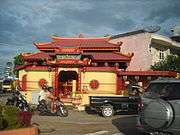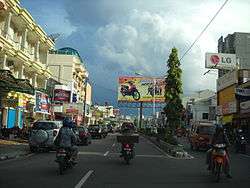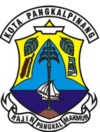Pangkal Pinang
| Pangkal Pinang | ||
|---|---|---|
| City | ||
| Other transcription(s) | ||
| • Chinese | 邦加槟港 (槟港) | |
| • Jawi | ڤڠكل ڤينڠ | |
|
Street view of Pangkal Pinang | ||
| ||
| Country | Indonesia | |
| Province | Kepulauan Bangka Belitung | |
| Founded | 17 September 1757 | |
| Elevation | 13 m (43 ft) | |
| Population (2012) | ||
| • Total | 327,167 | |
| Demonym(s) | Pinkong-Nyin (槟港人) | |
| Time zone | WIB (UTC+7) | |
| Area code(s) | +62 717 | |
| Website | www.pangkalpinangkota.go.id | |
| Pangkal Pinang | |||||||||||||||
| Traditional Chinese | 邦加檳港 | ||||||||||||||
|---|---|---|---|---|---|---|---|---|---|---|---|---|---|---|---|
| Simplified Chinese | 邦加槟港 | ||||||||||||||
| |||||||||||||||
Pangkalpinang (Jawi: ڤڠكل ڤينڠ, simplified Chinese: 邦加槟港; traditional Chinese: 邦加檳港; pinyin: Bāng jiā bīn gǎng, or Pîn-kóng (槟港) in Hakka), is the largest town on the Indonesian island of Bangka and the capital of the province of Kepulauan Bangka Belitung. It is located on Bangka's eastern coast at 2°8′S 106°7′E / 2.133°S 106.117°ECoordinates: 2°8′S 106°7′E / 2.133°S 106.117°E
Landmarks in the city include the Timah Museum, a Chinese temple, the Cathedral of St. Joseph, the Bangka Botanical Garden (BBG) and the Pasir Padi beach.
History
In order to control rich tin mines deposit on eastern Bangka, the Dutch moved the capital of Bangka Belitung's resident from Muntok to Pangkal Pinang in 1913.
Demographics

Pangkalpinang's population was 108,411 in 1990 and has risen to 174,838 at the 2010 Census.[1] The half population is the Malay which mainly speak Bangka Malay ("Bahasa Bangkak"), a variation of Malay dialects that used in Bangka and Belitung region and other half is the Chinese population, who originally immigrated from Guangdong province of southern China. They are called 'Peranakan' ("Children of the Indies") locally, and mainly speak a Hakka dialect with a small minority of Cantonese speakers. In conversation with another Chinese, they call themselves Thong Ngin (Tang People; 唐人) and Fan Ngin (Malay People; 番人) for local Malays.
Administration
The city is divided into five districts (kecamatan), tabulated below with their 2010 Census population:[2]
| Name | Population Census 2010 |
|---|---|
| Rangkui | 39,938 |
| Bukit Intan | 43,325 |
| Pangkal Balam | 41,055 |
| Taman Sari | 13,117 |
| Gerunggang | 37,323 |
| Gabek | new district ("kecamatan") |
| Mujair VI | 7 |
Economics
Pangkalpinang is one of the major ports on the Karimata Strait. It produces tin, white pepper, fish, copra, marine vessel.
The town has an airport with 2.350 m length and is served by flights from Jakarta and Palembang. Pangkal Pinang is connected by paved asphalt roads with other towns on the island.
There is important household manufacturing weaving, plating, metal-work, carving and basket making.
Notable People
- Artika Sari Devi, Miss Indonesia 2005, entrepreneur
- Sandra Dewi, actress & model
- Dimas 'Mbah' Oktarial, Mau Kawin
- Idang Rasjidi, Jazz Musician
Sister cities
See also
References
External links
| Wikimedia Commons has media related to Pangkalpinang. |
- Satellite picture by Google Maps
- Some Overview by www.indonesia.travel
- Demographic and Climate by beta.pangkalpinang.go.id

